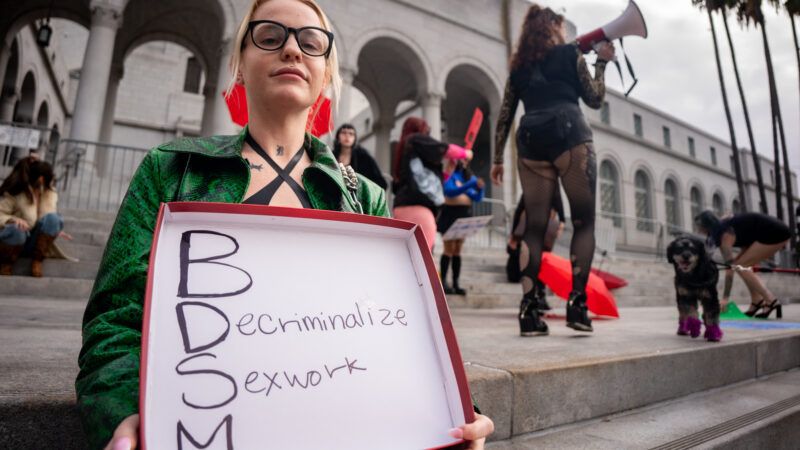Deplatforming Doesn't Make Sex Work Safer
Another study shows FOSTA failed.

We don't need a formal study to tell us that taking away sex workers' ability to communicate online makes their lives worse—sex workers have been saying that for a decade now, since the federal government started taking down websites where they advertised (RIP MyRedBook, Rentboy, The Review Board, Backpage, and so on). But here's a(nother) study saying exactly this.
For the study, published in the journal Social Sciences, researcher Melissa Ditmore and her team conducted a national survey of 440 sex workers, asking about how they used online platforms, how the use of these platforms affected their working conditions, and how laws like the Allow States and Victims to Fight Online Sex Trafficking Act (FOSTA)—which led to platforms removing and restricting sex worker accounts—affected their work lives. Survey respondents included folks who had engaged in webcam work, phone sex work, strip club work, pornography, independent escorting, street-based sex work, working at a brothel, working at a massage parlor, BDSM/fetish work, working for an escort agency, and other types of sex work.
Ditmore's team found—unsurprisingly—that "platform policies and practices often remove and/or limit sex workers' access to them, which, in turn, restricts their ability to earn income and compromises their capacity to live and work safely."
You are reading Sex & Tech, from Elizabeth Nolan Brown. Get more of Elizabeth's sex, tech, bodily autonomy, law, and online culture coverage.
78 Percent of Sex Workers Were Deplatformed
The researchers first sought to understand which online platforms sex workers are using. Payment processing platforms (65.7 percent), camming/phone sex/sexting/video call platforms (60 percent), chatting and communication platforms (56.6 percent), and social media (55.2 percent) were the most common, while advertising platforms were cited as the most useful.
Ditmore and team then asked about deplatforming, finding that 78.2 percent of the sex workers they surveyed had lost access to a platform (and sometimes more than one). This was most likely to happen with social media (32 percent), dating or hookup apps (24.4 percent), payment processors (22.1 percent), and advertising platforms (19.2 percent).
Losing access to online platforms was strongly associated with negative effects for those deplatformed.
"Of the 344 respondents who reported that they were de-platformed, 88.4% of these respondents reported their income declining as a result," the study states. A significant portion said their income never recovered. Many reported platforms (such as payment processors) keeping any money they had stored there. "Almost 60% of sex workers who responded to our survey could not get their money back from these platforms—findings that mirror those of The Free Speech Coalition, which found that 63% of sex workers in their sample had lost access to financial services from a bank or another payment platform like Venmo, PayPal, or CashApp," the study states.
The researchers point out that platform policies aren't only affecting sex workers engaged in illegal activity like prostitution. "Many sex workers who are affected by these measures do not engage in criminal activity. To name just some examples, creating and sharing sexual content like pornography online is legal for adults; communicating work schedules in licit sex work venues such as strip clubs is legal; and interpersonal communication of a sexual nature between consenting adults (e.g., sexting and chatting) is legal."
Hardships experienced after de-platforming weren't limited to income loss. In Ditmore's survey, 270 sex workers responded to a question about how deplatforming had affected them. Nearly two-thirds (64.1 percent) said it led to a loss of clients, and more than a third said it led to anxiety about online activity. Around a quarter (23.3 percent) said it made them feel less safe and around a fifth (19.6 percent) said it made them reluctant to speak out online.
For some, the results were even more dire:
- Around 14 percent (respectively) said it made their housing situation unstable, that they had difficulty finding other work, and that they lost access to peers who could help them with client reference checks (an important tool for vetting potential customers and avoiding those with a history of violence or exploitation).
- Ten percent said deplatforming led to more interactions with law enforcement, and 11.5 percent said it led to more social service interactions.
- Around 9 percent said deplatforming led to more interactions with madams/agencies/managers/pimps.
- Around 8 percent said they experienced "exploitative work conditions" after deplatforming" and 6.7 percent said they experienced "abusive work conditions."
Cutting Against the Pro-FOSTA Narrative
These results cut against the narrative pushed by proponents of FOSTA and laws like it, who argue that platforms where sex work is advertised make sex workers more likely to fall victim to exploitation and abuse.
It's a classic case of mistaken causation, with people taking increased visibility to them for increased prevalence overall.
Before the internet, it was rare for your average person to witness any evidence of sex work, let alone exploitation, abuse, and/or minors involved. But with sex workers migrating online to find clients, it was suddenly visible—to law enforcement, politicians, activists, and anyone who wanted to go looking for it—in a way it had never been before. Some concluded that the online platforms were therefore fueling exploitation and abuse.
But sex workers have long told a different story. They say that online advertising put more power in their hands, allowing them to find and communicate directly with customers instead of relying on middlemen (and therefore lessening the potential for abusive "pimps" and "traffickers") and helping them better weed out bad clients.
And, when abuse did occur, online ads and chats left a paper trail that could be utilized by law enforcement.
Building on a Body of Research
"Given the challenges of sampling sex workers, we cannot confirm that these data are representative of all sex workers in the USA," Ditmore and her team point out. But their findings jive with previous reporting and research on this subject.
Since the government started going after ad platforms where sex workers advertised, both sex workers and members of law enforcement have been speaking out about how it's negatively affected their work. This comes in the form of many anecdotes, of government reports, and in the form of research, often conducted by or in conjunction with sex workers.
Several studies to this effect have been spearheaded by the sex worker rights group Call Off Your Old Tired Ethics Rhode Island (COYOTE RI). "The loss of advertising and increased financial hardship after FOSTA forced many sex workers onto the streets," according to one COYOTE RI report. The same report also found that 11 percent "of participants who had not previously engaged in street-based work turned to it after the passage of FOSTA" and "that number was much higher for vulnerable groups—17% of trafficking survivors, 24% of those who entered the industry as minors, and 21% of people with disabilities turned to street-based work."
The group's survey also found that FOSTA "increased sex trafficking and recruitment by pimps," that it reduced their ability to screen clients, and that it "also made work conditions more dangerous in other ways; largely because of increased financial hardship and more difficulty in finding reliable clients, 35% of participants had to lower their rates (44% of trafficking survivors and 46% of those with disabilities) and 41% started
offering services that they were not comfortable with (47% of trafficking survivors and 52% of those with disabilities)."
Research has also found that the introduction of Craigslist's Erotic Services ads was linked to a reduction in female homicide and rape in the cities where it was introduced.
Follow-Up
Backpage co-founder Michael Lacey was sentenced last week to five years in federal prison and a $3 million fine. Lacey was ordered to report to federal marshals in two weeks.
A five-year sentence is better than things could have gone—prosecutors were seeking a 20-year sentence. But it's still quite the punishment for a 76-year-old man convicted of one victimless financial crime, and one that makes little sense at that. Following a jury trial, Lacey was convicted of international concealment of money laundering but not of any underlying illegal conduct.
"Following an 11-week trial in 2023, a jury was hung on 84 counts involving conspiracy, money laundering and violations of the U.S. Travel Act, a federal law that makes it illegal to use a means of interstate commerce to facilitate a business enterprise involved in breaking state laws against prostitution," notes Stephen Lemons. "Following the trial, Humetewa acquitted Lacey of 50 of those 84 counts, leaving 34 outstanding. Prosecutors said they will await the result of the appeals process before retrying Lacey on the remaining counts."
More Sex & Tech News
• "The third circuit's Section 230 decision in Anderson v. TikTok is nonsense," writes Corbin K. Barthold.
• The Democratic National Convention "showed us how Democrats continue to fail Stormy Daniels and sex workers," writes Ro White. "Democrats' transgressions paint a grim future for sex workers under any administration—whether it's led by Harris" or by Trump, he suggests.
• A federal judge has temporarily barred New York from going after crisis pregnancy centers for promoting abortion reversal. "The First Amendment protects plaintiffs' right to speak freely about [abortion pill reversal] protocol and, more specifically, to say that it is safe and effective for a pregnant woman to use in consultation with her doctor," the judge's decision said.
• Democrats want the Federal Election Commission to censor Grok.
• "Did the U.S. government outsmart a ring of international drug smugglers by creating a Trojan Horse of a phone company to spy on them? Or did the government cross a line, encouraging criminal conduct itself?" asks Courthouse News Service.
• Tech platforms want to push age verification duties on to app stores; app stores want to push age verification duties on to tech platforms.
• A federal judge has partially blocked Texas from enforcing the "Securing Children Online Through Parental Empowerment" (SCOPE) Act, which was set to take effect on September 1. "The ruling didn't find that the entirety of HB 18 posed a threat to First Amendment-protected speech, and some provisions—like the data collection rules and the age verification for sites with large amounts of adult content—remain in force," notes The Verge. But the judge "was highly critical of the monitoring and filtering rules," which require certain large platforms to prevent minors from being exposed to "harmful material."
Today's Image



Show Comments (14)